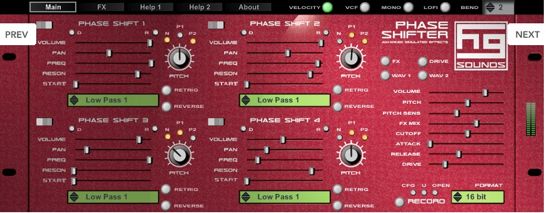
Free Music Software: In the late 60’s composer Steve Reich stumbled across a technique he called phasing, which was to have two identical tape loops that run at slightly different speeds, the result is that every possible combination of sound is cycled through until they arrive back in sync. The result with a melodic piece of music is that it moves through moments of chaos and moments of melody.
Phase Shifter is a Windows VST designed to make it easy to create phase shifting music, like the early work of Steve Reich. It also has a built in recorder so that the output can be recorded directly to disk. It works by loading up to 2 WAVs, and is triggered via a MIDI keyboard. Middle C will play the WAV at it’s original speed.
You can preview the results of Phase Shifter below.
Download here.

This is really neat, but shows the limitations of digitally-base phasing: when the two tracks are digitally/acoustically identical (as opposed to notationally identical or identical on tape), a lot of the brilliance of in-air mixing and dynamic interpretive gloss is lost. When the two parts play at once, they sound just like one part, played louder; if you did this on two pianos, it would sound like two pianos playing at the same time.
(Of course, it looks like there are features built in to this to slightly alter the tracks and offset this problem a little bit, but in my experience the improvement from that is marginal compared to analog phasing.)
Nick – good point – but a better comparison might be to Reich's actual tape pieces, like Come Out.
I agree that much of what makes Reich's phase music interesting, though, is a result of the way people don't accurately repeat themselves..
Yeah, I was mostly responding to the quality of that preview, which actually uses Piano Phase as a model.
I still think, though, that the process of phasing from two distinct analog tapes, mixed down to one analog recording, avoids many issues with digital phasing. This makes me feel crazy, because normally I'm all for discarding analog fetishism, but in this case, I think it makes a difference! (and I'm saying that as someone who has made digital phasing-based compositions)
Good points.
I'm not all for discarding the analog fetishism, though! The more analog and fetishistic, the better!
Bring on the Goldfrapp!
what was I thinking, denigrating analog fetishism on a synth blog!?
We will sick the Frapp-ettes on you now:
<img href="http://farm1.static.flickr.com/69/215919155_26d9e159e6.jpg"/>
We must sick the Frapp-ettes on you now:
<img src="http://farm1.static.flickr.com/69/215919155_26d9e159e6.jpg" />
Corrected download link: http://www.kvraudio.com/developer_challenge_2009…. (_49instead of _29)
Superb tool for shuffles commonly used in minimal!
Updated the link. Thanks!